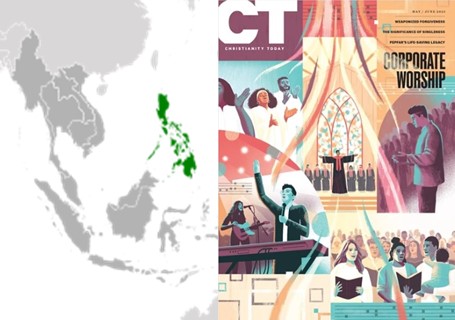Response to Hannah Agustin’s Article “Colonialism Brought Evangelicalism to the Philippines: Churches Are Now Untangling the Two”
In this review essay by seasoned missionary-scholar Dave Johnson, he takes a more nuanced approach to globalism, colonialism and the Filipinos efforts to contextualize the gospel and Church practices in the Philippines.

Hannah Keziah Agustin, “Colonialism Brought Evangelicalism to the Philippines. Churches Are Now Untangling the Two: Five Filipino Christian leaders weigh in on the American church’s influence on worship, culture, and politics” Christianity Today (June 28, 2023).
I would like to thank the editor of Pneuma Review for the opportunity to respond to Hannah Agustin’s article. I will divide this response into areas where I agree, issues that I think need clarification and points where I respectfully dissent. But first, I need to challenge her demographic facts. While she is correct that 80% of Filipinos are Catholic, the waters get muddied in identifying everybody else. The Pentecostal-Charismatic (PC) movement crosses all denominational lines and defies neatly packaged definitions. It also challenges statistics related to size. For example, the Catholic Charismatic movement, which holds as dearly to the Bible as do Evangelicals, numbered over ten million in 2008.[1] This does not include classical Pentecostals, such as the Assemblies of God and other groups, which are normally counted as Evangelicals, or Pentecostal Third Wave independent churches, some of which are huge. The origin of the majority of these churches, as well as some Pentecostal denominations, are indigenous. Considering that the population of the Philippines was 109.04 million in 2020,[2] it is safe to say that PC Christians comprise of at least 10% of the total Filipino population.
That said, she is correct in noting the strong impact of American evangelicalism in the Philippines. I share the respondents’ frustration about the importation of American culture, intentional or not, along with the gospel. While this is unavoidable to a certain extent, much could be done to reduce this by equipping missionaries with the tools of cultural anthropology. Unfortunately, most do not take advantage of this training. But the assumption of cultural superiority, intentional or not, also needs to be nuanced. This is not just an American problem. It’s a been a human problem since the time of Nimrod (Gen. 10) and Filipinos are no exception. Moreover, I have been appalled that perhaps as many as 95% of missionaries working here, whether from the West or other Asian nations, have made little effort to learn any of the indigenous languages.
American evangelicalism has made a strong impact in the Philippines.
All of the respondents mentioned things that the American missionaries brought into Filipino churches and allegedly forced on Filipinos. While much of this is true, none of the respondents mention efforts made by Filipino leaders to change things once the churches were turned over to them. This reflects the Filipino attitude of bahala na, which loosely means, “whatever will be will be and cannot be changed.” Fortunately, this is now beginning to change and I applaud these efforts.
Furthermore, the Filipino churches may be more indigenous than the respondents realize. Here, let me be clear that I am speaking from within my own PC tradition. In the Filipino Assemblies of God (AG), for example, the national ecclesiastical structure is almost a carbon copy of its counterpart in the States. How those leaders function within the structure, however, is completely Filipino. On the local church level, the differences between the churches in the Philippines and the United States are substantial.
More importantly, Obed Reliquette’s comment about American Evangelicalism’s attitude towards animism is largely true, but also needs nuancing in regards to the PC movement. PC spirituality, with its focus on the person and miraculous power of the Holy Spirit, resonates deeply with the Filipino’s original indigenous religious spirituality, which is focused on supernatural power. This morphed into Folk Catholicism in the Spanish era and continues to this day. This is probably the most significant reason for the stupendous growth of the PC movement in the Philippines in the last fifty years.
The assumption of cultural superiority is not just an American problem.
Finally, in an article about the Philippines, I do not understand why the author included a Filipino respondent living in the United States. The situation of Filipino-Americans, as reflected in their comments, is vastly different from Filipinos living at home. This should not have been included.
In summary, I agree with much of what has been said and share the respondents’ desire for greater indigeneity. I also think that the author should have done much more background research. Had she done so, she would likely have discovered that the situation is much more complex and nuanced than is reflected in this article. Thank you again for this opportunity.
PR
Notes
- Christl Kessler and Jürgen Rüland, Give Jesus a Hand: Charismatic Christians: Populist Religion and Politics in the Philippines. Quezon City, Philippines: Ateneo de Manila Press, 2008.
- Population of Philippines 2020 – Search (bing.com) https://www.bing.com/search?q=population+of+philippines+2020


